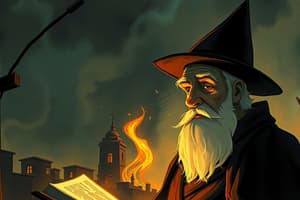Podcast
Questions and Answers
Why does Wiesel describe the daybreak light as grayish instead of yellow or golden?
Why does Wiesel describe the daybreak light as grayish instead of yellow or golden?
Night has infiltrated, and day has a negative connotation; night continues on into daylight.
How is the German worker who throws the first piece of bread similar to the French woman who throws coins to the 'native' in Aden?
How is the German worker who throws the first piece of bread similar to the French woman who throws coins to the 'native' in Aden?
Both needed those things to survive, and they found amusement in the chaos they caused.
Explain how the father and son killed in the cattle-car next to Wiesel died.
Explain how the father and son killed in the cattle-car next to Wiesel died.
The son beat his own father for a piece of bread, and others killed the son to take his crust of bread.
What is the first name of Elie Wiesel's father?
What is the first name of Elie Wiesel's father?
Of the 100 inmates who were loaded onto the cattle car, how many survived the trip and were able to walk off the train?
Of the 100 inmates who were loaded onto the cattle car, how many survived the trip and were able to walk off the train?
Find and write two lines from this chapter that would be useful in an analysis of the book's title, Night.
Find and write two lines from this chapter that would be useful in an analysis of the book's title, Night.
Flashcards are hidden until you start studying
Study Notes
Chapter 7 Summary Notes
- Wiesel describes the approaching daybreak as "grayish," symbolizing a bleakness and the persistence of despair, contrasting the typical warmth associated with dawn.
- A German worker throwing bread evokes parallels to a French woman tossing coins; both acts stir chaos and suffering among the starving, reflecting a cruel amusement at others' desperation.
- A poignant incident illustrates the depths of human desperation: a son, driven by hunger, kills his father for a piece of bread, highlighting the extreme moral degradation experienced in the camps.
- Elie Wiesel's father's first name is Shlomo, allowing for a personal connection and deepening the reader's understanding of his familial bond.
- Out of 100 inmates loaded onto the cattle car, only 12 survived the journey and managed to walk off the train, underscoring the horrific mortality rate during transport.
- Two impactful lines for analyzing the title "Night": Wiesel recounts a moment of awakening to choking hands, symbolizing the engulfing darkness and violence that characterize their experiences.
Studying That Suits You
Use AI to generate personalized quizzes and flashcards to suit your learning preferences.




